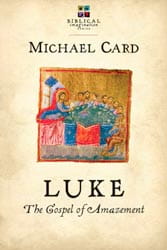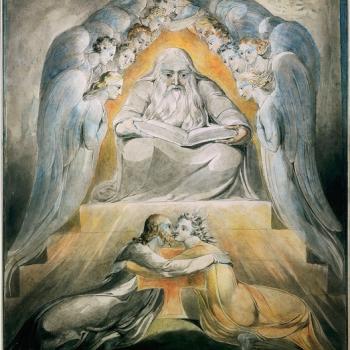 In the process of becoming the bestselling book of all time, the Bible also became many other things. It's been a sack of proof texts to support what many of us want to believe, whether the Bible teaches it or not. It's a first aid kit to solve or at least bandage every situation in life (as long as our lives don't get too hairy . . . and whose doesn't?). It's a database for theological thinking or writing and a club to whack those who transgress our ego boundaries by disagreeing with us. Even if we don't read it, we carry, keep, and give it as if it could convey the power of God just by holding it in our hands.
In the process of becoming the bestselling book of all time, the Bible also became many other things. It's been a sack of proof texts to support what many of us want to believe, whether the Bible teaches it or not. It's a first aid kit to solve or at least bandage every situation in life (as long as our lives don't get too hairy . . . and whose doesn't?). It's a database for theological thinking or writing and a club to whack those who transgress our ego boundaries by disagreeing with us. Even if we don't read it, we carry, keep, and give it as if it could convey the power of God just by holding it in our hands.
Michael Card, in Luke: the Gospel of Amazement, wants to help us do something different with the Bible. With this (and three volumes on the remaining Gospels, all from InterVarsity Press), he wants us to uncork this rich book, letting it breathe until we drop our jaws and defenses, and fall in love with the main character—Jesus Christ. Michael finds his interpretive key in imagination. He helps us revive it as something often lost in "growing up." Card wants us to smell the sweat of fishermen and sneeze on Galilean road dust. He wants us to hear the tremble in screaming voices where panic threatens to strangle hope as the blind cry out, "Jesus, Son of David, have mercy on me!" (Lk. 18:38) Before imagination becomes something that takes us to new things from God, Houston, we have a problem.
We are the problem. Card points out that every time a bird flees our approach or passing, it's a reminder both that something is broken throughout the created order and that we did the breaking. Our mind doesn't just stumble over the Bible because it's hard. Imagination didn't just wither because we left childhood behind. Spiritual darkness brewed and drunk deeply in our souls has swallowed both. His thoughts on the integration of the mind with the heart under the infused light of Jesus Christ explain and remedy how we can believe the right things yet remain the same ornery, repulsive wads of spiritual ooze for most of our lives. He then opens the casks of the good wine of his work. First, why did, not Luke, but the Holy Spirit write this story, verse, etc.? Left alone, we come to the Bible looking for something for ourselves, our lives and problems. That's fine but would God like to say something here that lifts us into what excites and engages Him?
Next, imagination leads to intimacy. For Greek verb afficionados, the New Testament contains five different words for "amazement" and Luke uses them all trying to hold a gallon of meaning and reality in a pint of vocabulary. The real biblical Jesus dropped everyone's jaw—in broken surrender, fiery hatred, or simple astonishment. Luke, and Michael Card, wants us to see that it is amazing that these things not only happened but that they were recorded. I have almost always choked up at the first recorded resurrection appearance to Mary in John's Gospel. The incident and conversation are so personal that even to read them now seems a gross intrusion and violation of privacy. Luke gets it. Under the editing of the Holy Spirit, he writes the diary of God. While anyone's diary or journal is deeply personal and usually private, God breaks His open for all to see.
"The Gospel of Amazement" isn't a commentary per se. Almost no one (except reviewers) goes end-to-end through a scholarly commentary. It breaks the Gospel of Luke into manageable chunks good for study or Lenten reflection. Card, while he is known for his music (a companion CD will be available for every volume), has also worked hard at theological study. Having an earned degree, he passes along the fruit of his study with grace. He does theology "alongside." He introduces us to Luke. Who is he and what do we know about him? How does he bring himself to his writing (as every writer does)? Card even advances his own thoughtful theory (no spoilers here) that you will find interesting whether you agree or not.
- Read more about this book
- Read the Preface to the book
- Scholars and artists discuss cultivating a 'holy imagination' here
He draws out the major themes. Writers know the humbling experience of being reviewed. And most who get reviewed shake their heads in befuddlement as reviewers pontificate on the psyche of the author, the writing style, and the meaning of the book coming to conclusions five galaxies removed from what and why the author wrote. A book means what the author says it means and nobody knows this better than the author.



